GALLUP NEWS SERVICE
PRINCETON, NJ -- The Bush administration denies that the current efforts to force a showdown with Saddam Hussein have anything to do with the November elections, and most Americans agree. But a new CNN/USA Today/Gallup poll suggests that whatever the administration's intentions, the current attention given to a possible war with Iraq may well help Republicans.
Additionally, Gallup polling shows that the initial instinct of the American public is to favor rather than oppose U.S. military action in Iraq, by a 57% to 39% margin in the latest poll on the topic. But a detailed analysis shows about four in 10 Americans hold a "permissive" attitude about such a war, indicating they would not be upset whether such a war did or did not occur, despite their initial inclinations in one direction or the other. The remaining 60% of Americans feel more strongly about the issue, breaking slightly in favor of war, by a margin of 34% to 26%.
The latest poll was conducted Sept. 13-16, before Saddam announced his readiness to allow U.N. weapons inspectors back into his country without conditions, an offer the Bush administration dismisses as a ploy to delay military action. Still, the poll provides insights into the political dynamics of the Iraqi war issue, suggesting that the more attention paid to this issue, the more Republicans may benefit in the November elections.
The current poll, along with two other polls this month (Sept. 2-4, and Sept. 5-8), show that Americans are predisposed to accept a U.S.-led war with Iraq, with the intention of ousting Saddam from power. Fifty-seven percent of respondents in the most recent poll say they would favor such an action, while 39% would be opposed, an 18-point margin that is only slightly smaller than the 22-point margins found in each of the two previous polls. But the Sept. 2-4 poll also shows that only 34% of Americans really want a war with Iraq (they would be upset if the government decided against war), while only 26% really do not want such a war (they would be upset if the government decided in favor of war). The other 40% of Americans have what Gallup describes as a "permissive" opinion -- they would not be upset with either decision on the war.
| Attack Iraq to Remove Saddam Hussein? |
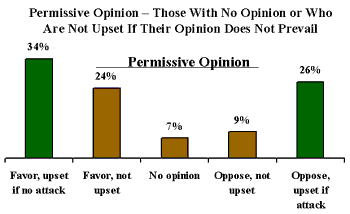 |
| Sept. 2-4, 2002 |
The figures in the preceding chart show that those with "permissive" opinions include three groups: 7% who express no opinion, 24% who say they would favor war but would not be upset if it did not occur, and 9% who say they oppose war but would not be upset if the government decided to go ahead anyway. These results suggest that if war were to occur, there would be much greater support than the initial figures indicate. Indeed, the Sept. 13-16 poll shows that 83% of Americans would favor sending ground troops to Iraq if the United Nations authorized that action.
These results also suggest that significant numbers of Americans (about four in 10) are presumably looking to elected leaders to provide guidance on this matter, because their own opinions are not firm. Here the Republicans would appear to have an advantage, as Americans say Republicans are more likely than Democrats to make the "right decision regarding Iraq," by a margin of 43% to 32%. These results are virtually identical to those found in a similar poll last month.
| Which Party More Likely to Make the Right Decisions Regarding Iraq? (% Among All Americans) |
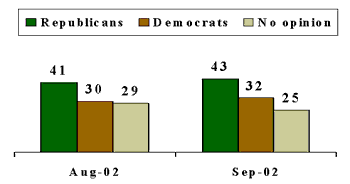 |
President's Motives Viewed Positively
While some Democrats have criticized the president for pushing the Iraqi issue in the months leading up to the November congressional elections, most Americans hold a positive view of the president's motives. More than two-thirds (68%) say Bush is taking action now "mainly because he believes prompt military action is necessary to protect the U.S. from terrorism," while just 26% opt for the more skeptical view that Bush is taking action now "mainly because it might help the Republicans in this year's congressional elections."
Just your best guess, why do you think President Bush is asking Congress at this time to support military action against Iraq -- [ROTATED: mainly because he believes prompt military action is necessary to protect the U.S. from terrorism, (or) mainly because it might help the Republicans in this year's congressional elections]?
|
Necessary to |
Help Republicans |
No |
|
|
2002 Sep 13-16 |
68% |
26% |
6% |
Even a majority of Democrats accept the positive view of Bush's intentions, by a margin of 53% to 41%. Independents and Republicans show even larger margins in favor of Bush's intentions.
| Reason Why Bush Taking Action Against Iraq
Now: Compared by Party |
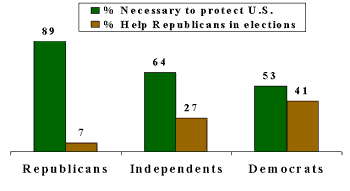 |
| Sept. 13-16, 2002 |
Americans are not as generous in their feelings about the Democrats, however. By a margin of 59% to 35%, they are more likely to think that the reluctance of some Democrats to have a vote on military action before the November elections results from politics rather than a genuine desire to obtain more evidence.
Just your best guess, why do you think some Democrats in Congress are reluctant to have a vote on military action against Iraq before the November elections -- [ROTATED: mainly because they want more evidence from the Bush administration that prompt military action is necessary, (or) mainly because a vote before this year's congressional election might hurt the Democrats]?
|
Want more evidence from administration |
Might hurt Democrats |
No |
|
|
2002 Sep 13-16 |
35% |
59% |
6% |
Only among Democrats is there a majority (51%) who believe that the reluctance among some Democrats in Congress to have an immediate vote is because they really want more evidence from the administration about the need to attack Iraq. Among independents and Republicans, large majorities opt for the more cynical response.
| Reason Some Democrats Are Reluctant to Have
Vote on War With Iraq Before the Election: Compared by Party |
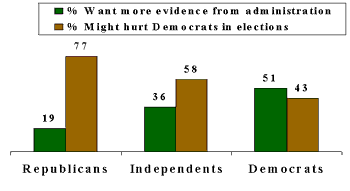 |
| Sept. 13-16, 2002 |
In addition, a slight majority of Americans, 55%, say a vote on whether the United States should attack Iraq should be held before the elections, while 39% say the vote should occur later. Even a plurality of Democrats say the vote should occur before the elections, by a margin of 49% to 45%. The margins are much larger between the other two partisan groups.
When do you think Congress should vote on a resolution to take military action in Iraq -- before the congressional elections this November, after the congressional elections but before the end of the year, or sometime early next year?
|
|
After elections, before end |
|
|
|
|
|
2002 Sep 13-16 |
55% |
24% |
15% |
1% |
5% |
Both Republican and Democratic congressional leaders have promised a vote on a war resolution before Congress recesses in October.
Iraqi Issue Could Help Republicans
With the Republicans enjoying only an 11-seat margin in the House of Representatives, a shift of just six seats to the Democrats would give the Democratic Party majority control. Thus, any issue that can affect the vote of even a small minority of voters could also affect which party wins in November.
According to the Sept. 2-4 poll, Democrats enjoy a lead among registered voters in the generic ballot (which party people will vote for in the congressional election) by just three percentage points (46% to 43%). In that poll, Americans also indicate that their vote choice will depend more on the state of the economy than on the possibility of war with Iraq, by a margin of 57% to 34%. But should that emphasis change, as the news focuses more on a possible U.S. attack on Iraq than on the economy, that could hurt the Democrats in the elections.
The Sept. 5-8 poll shows that Americans are evenly divided over which party can do a better job of keeping the country prosperous, but by a margin of 50% to 31%, they think the Republicans can do a better job of protecting the country from international terrorism and military threats. These results suggest that it is in the Republicans' interest for the campaign to focus more on foreign than on domestic policy.
The current poll results reinforce that view. When asked which type of candidate they would more likely support -- one who voted in favor of sending troops to Iraq or one who voted against that proposal -- a majority, 56%, said it would make no difference. However, the rest divided in favor of voting for sending troops, by 26% to 16%, with 2% unsure.
Would you be more likely to vote for your representative from Congress if that person voted -- [ROTATED: in favor of sending ground troops to Iraq, (or if that person voted) against sending ground troops to Iraq]-- or would it not make a difference to your vote either way?
|
In favor of sending troops |
Against |
|
No |
|
|
2002 Sep 13-16 |
26% |
16% |
56% |
2% |
These views are highly related to party affiliation. Although a majority of all three partisan groups say the Iraqi issue would make no difference in their vote, among those who say the issue would influence their vote, there are large differences among the parties. Republicans would vote for the pro-war candidate by 43% to 2%, while Democrats would vote for the anti-war candidate by 26% to 14%. Independents would be evenly divided.
| More Likely to Vote for Which Type of
Candidate: Compared by Party |
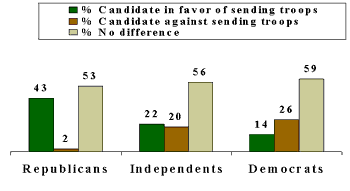 |
| Sept. 13-16, 2002 |
Survey Methods
The latest results are based on telephone interviews with 803 national adults, aged 18 and older, conducted Sept. 13-16, 2002. For results based on the total sample of national adults, one can say with 95% confidence that the margin of sampling error is ±4 percentage points. In addition to sampling error, question wording and practical difficulties in conducting surveys can introduce error or bias into the findings of public opinion polls.
